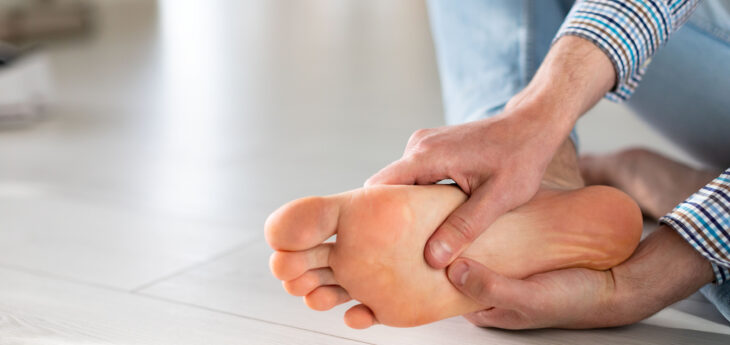
Diabetes: Tips for self-care of the feet
Our feet are one of the most important parts of the body. Feet help us move from one place to another. When our feet are strong and healthy, we have the opportunity to live independently. But even the slightest foot problem can affect how active we live. Diabetes is a chronic disease that affects our eyes, nerves, kidneys, heart, feet. This is why diabetes has the reputation of being the ‘silent killer’. Medical professionals today are on the lookout for affordable and successful treatment options for diabetes.
Feet are designed to bear the weight of our entire body when we walk or move. When a diabetic patient is unable to keep their blood sugar levels under control, the nerves in their feet are damaged. This is called “diabetic peripheral neuropathy”. Further, this damage to the nerves of the feet (neuropathy) is classified as sensory, motor, and autonomic neuropathy.
Sensory or sensory neuropathy causes abnormal sensations in the feet such as tingling, burning or prickling. In movement neuropathy or motor neuropathy, the muscles of the feet become weak. Most of the time patients have slippage of shoes while walking, difficulty in keeping feet firmly in place and feeling unsteady. This change in the feet causes abnormal changes in the skin of diabetic feet. Thus the skin changes on the feet get worse (autonomic neuropathy).
The bottom of the feet becomes very dry and scaly, thickened and rough (called callus), cracks/sores (called fissures) in the skin of the feet. Most of the time, the main reason for this is dehydration and inadequate hydration of the feet. All these together are known as ‘diabetic foot syndrome’ or in English ‘diabetic foot syndrome’. Foot care for those with such problems is provided by “Podiatrist” or “Diabetic Podiatrist” who are experts in this field.
Every year “International Diabetic Foot Day” or “International Podiatry Day” is celebrated on 8th October. On this occasion, Center for Diabetic Foot Care and Research (CDFCR) of Kasturba Medical College and Hospital, Mahe, in collaboration with the Karnataka edition of Indian Podiatry Association (IPA) wishes everyone good foot health. We know how concerned diabetics are about the health of their feet. By answering some of the frequently asked questions about diabetic foot care, an attempt has been made to broaden public awareness and increase knowledge on the subject.
Foot Health in Diabetics: Frequently Asked Questions
Do all diabetics need foot care?
Answer: Every diabetic should get their feet health checked by a doctor who specializes in diabetic foot care every 3-6 months. If any problems are found in the feet they should get the prescribed treatment.
What are the signs of diabetic foot syndrome?
Answer: Diabetic foot syndrome can take many forms. Some of the common symptoms seen by patients are dry/discolored/itchy skin on feet, pins and needles/tingling/burning/tenderness in feet, difficulty in forefoot movement, slippery feet, excessive sweating of feet, swelling around feet and ankles, blistering of feet, frequent nail/ Appearance of scar/ roughening of skin (callus)/ scar etc.
Will my diabetic foot syndrome be completely cured?
Answer: Since diabetes is a progressive disease, diabetic foot syndrome is unlikely to be completely cured. But timely treatment can reduce these symptoms and lead a healthy life.
Can I soak my feet in hot salted water?
Answer: No, feet should not be immersed in hot water mixed with salt.
Can I get a pedicure for my feet?
Answer: No, no foot pedicure should be done in parlors/salons/spas.
Can I grow toenails?
Answer: No, toenails should not grow too long. Nails should be cut using a nail cutter and the edges should be trimmed.
What to do if toenails are ingrown/twisted?
Answer: No surgery should be done at home using knife/blade/nail cutter. A podiatrist should be consulted for ingrown toenails or ingrown toenails.
Can you walk barefoot?
Answer: No. Do not walk barefoot inside or outside the house. Wear comfortable footwear as prescribed by your doctor. Don’t walk barefoot even in flower gardens/beaches/religious places.
Why check shoes daily?
Answer: The wound/cracks on the soles of the feet go unnoticed by many diabetics. Therefore, you should check the soles of your feet and feet daily using a small mirror.
How to self-examine your feet?
Answer: You can check your feet yourself. Sit comfortably on a chair/sofa. Lift one leg over the other and use a small mirror to examine the skin on the soles of the feet. If there is vision impairment or difficulty in movement, get regular foot checkups with the help of family members/caregivers.

